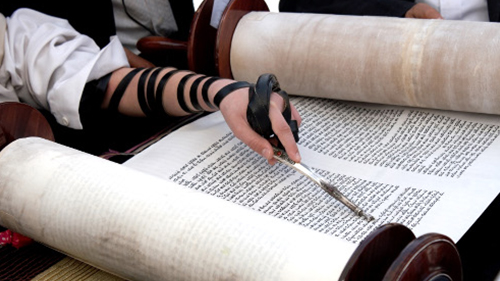What does it mean to choose? How important are our decisions? Choosing can range from what to wear, to what to say, to how to live our lives.
In our Torah portion, Re’eh, God places before the Israelites blessings and curses as they are about to enter the Holy Land. Blessings will come to the Israelites if they follow His commandments and curses if they don’t.
Every year in the United Kingdom, 18 millions tonnes of food end up in landfills. Approximately, one-third comes from the producers of the supply chain, one-third from retail, and one-third from households. It costs the country 23 billions British Pounds every year. Either we produce too much food, or we do not eat it on time. On the other hand, one-fifth of the population is struggling with “food poverty”, that means that more and more people are eating poorly, unhealthy food, process food, or simply not enough food, or are relying on charities to obtain food. These figures apply to the United Kingdom, but the same pattern is true in all the developed countries all around the world. Today, we find ourselves in a paradoxical situation: we live in a populated world (some say over-populated), where technology makes it possible to feed each and every one of us, and yet, people are still struggling to have enough food, or to have proper nutritious food.
I’m writing this drash in the week of the Wall: the week when the Israeli government decided to freeze its promise, negotiated through the good offices of the Jewish Agency over 18 months ago, to legalise freedom of religion at the Kotel by permitting egalitarian worship in a specially marked section. Though that section, the Wall’s southern expanse at Robinson’s Arch, has been used for egalitarian worship services for several years, the agreement would formally incorporate it into the Wall precinct and at the same time protect it from a rabbinical takeover.
Death and Life Are In the Power of The Tongue (Proverbs 18:20)
“These are the words that Moses spoke to all of Israel(1:1)….”
Thus opens the fifth book of Torah, with Moses exhorting the people: where they have been, where they are now and ….towards where are they going. For a moment let us return to the outset of Moses’ mission: God’s summons him, empowering him to redeem the People of Israel.
“Let this land be given to your servants as a heritage; do not take us across the Jordan.”(Bamidbar 32,5b). This is what two and a half tribes ask of Moses as the people of Israel are getting ready to cross over the Jordan River and conquer the promised land. Why would they ask to stay on the eastern side of the Jordan valley? They have the explanation in the first phrases of the portion Matot:
In life we do not always accomplish our dreams. We anticipate, for example, retirement hoping on leaving behind us a legacy; yet, often times that road to glory can be tricky. Unexpected results can alter those cherished hopes. How does Moses’ inward thinking about God’s announcement that he be forbidden to enter the Promised Land […]
Imagine the scenario: just across the border, a significant number of people are gathering. They come from a different place, they speak a different language, and they have different cultural norms. We can all imagine what would happen.
After a lacuna in the Torah text of thirty-eight years, the narrative resumes once again in Parashat Chukkat, Numbers chapter 20 verse 1, with the death of Miriam. What do we know about Miriam? First: Big sister (unnamed), she helps her mother to save her baby brother, whose life is threatened by the Pharaoh’s decree […]
“When you set the lamps, let the seven lamps give light at the front of the lampstand” (Bamidbar 8:2). Aharon has been told by God to place the golden menorah in the Mishkan in such a way that the light will shine to the front. Aharon could have made the angle of the menora so […]
A month ago I was sitting in an elementary school classroom on plastic chairs waiting for Friday night Shabbat Services to begin in the town of Gedera, which is south of Rechovot. This is an amazing congregation which has fought in court against the local government in order to win the right to hold their Shabbat services in a local elementary school.



